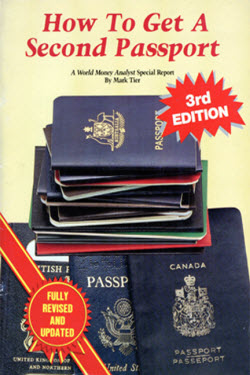Chapter 8
How Another Passport Could Save You A Bundle In Taxes

A very wealthy American once visited me to discuss my analysis of Portugal. Subsequently he purchased a property in the Algarve and became a Portuguese resident.
Why should an American desire to give up his passport — one of a kind that millions of other people would so dearly like to have?
The simple answer is taxes. In the case of this man it was death duties he wanted to avoid.
The attraction of Portugal for him was that he had not definitely decided to give up his US citizenship That it takes six years from residency to citizenship allows him the luxury of procrastination.
In fact to relieve his assets outside the US from US death duties, he did not have to change his nationality; all he had to do was establish a permanent home somewhere other than the US, and to be able to provide his heirs with proof that his intention was to make that permanent home permanent — which in legal parlance is called domicile. (It is income tax and capital gains tax that US citizens must continue to pay regardless of where they are resident, or domiciled)
Other factors in his case, which would apply only to few of us, were that he spent half the year cruising in the Mediterranean in his yacht, loved the Algarve region anyway, and bought the property with what was for him small change.
On another occasion, a Japanese gentleman called at our office to pick up a copy of How To Get A Second Passport. He also wished to avoid death duties. His methodology was different, no doubt owing to differences in Japanese law.
He told us that under Japanese law a stamp of residence in another country was sufficient proof that he was non-resident of Japan for tax purposes. By simply becoming a resident of Portugal he would cause his estate to be free from Japanese death duties. Whether this applied to duty on such of his assets as remained in Japan was not clear, and in any event it is not my function to go too deeply into these technical details. But these examples do show that a second passport can have benefits beyond those the original ambit of this analysis.
How to use residency/citizenship laws to avoid taxes
All but two of the countries of the western world (the exceptions being the US and the Philippines) levy personal income taxes on the basis of residence. Domicile, which involves a more permanent attachment than mere residence, can also be a factor in some of the more detailed applications of income tax liability, and is also a major factor in determining where your estate is primarily accountable for death duty.
[The location of assets is also a factor — death duty can be charged by the country in which the assets are situated, in addition to the country where you are domiciled when you die. So some assets may attract duty in two countries. There is usually — depending on tax treaties — some relief allowed for this double taxation.]
This is not the place to go into the intricacies of domicile — suffice it to say that it is not necessarily the same as residence, and if you have any reason to wish to know where you may stand in this regard you really ought to see a lawyer.
Residence, which for most purposes is the basis for determining income tax liability, is somewhat simpler, and although the test varies from country to country, the relevant facts are most often all or some of the following:
where you normally maintain a home and normally live;
where your spouse lives;
where your children go to school;
where you spend most of your time in the fiscal year.
The 183-day rule
It is where you spend most of your time in the fiscal year that can be the most important factor. If you have been physically present, for more than half the fiscal year, in a country where you maintain a residence, that country will normally apply its income tax and capital gains tax laws to you in their full rigor. For advice in detail on any specific country, consult an appropriate tax specialist.
To avoid income tax: become non-resident
To avoid income tax, you need only, as a general rule, be a non-resident of the country concerned. A wealthy, retired, Australian that I know goes on two world trips a year, each just over three months. He is therefore not resident in Australia for tax purposes, he says. His money is invested through his Swiss bank or other offshore brokers: with no Australian-source income he is not liable for any Australian income tax or capital gains tax.
But this tactic will not help you avoid death duties (which do not exist in Australia, but do exist in almost all other developed countries). With only one domicile, regardless of where you spend most of your time and regardless of where you die, the government of the country of your domicile is sure to seek what it regards as its rightful share of your estate.
To avoid death duties: establish a foreign domicile
To avoid death duties, one must establish a foreign domicile. Portugal could be an obvious choice, for you can keep your permanent residence there without the obligation to live there most of the time.
To change your domicile, however, you do need to sever links with the country of your original domicile, as well as make a permanent home somewhere else. But beware of acquiring a new tax-residence or domicile in a country where taxes or death duties are harsher than those you are escaping: out of the frying pan into the fire!
Anyone contemplating taking up residence in a new country, whether or not with a view to acquiring a passport, ought to obtain thorough tax advice before going too far along the line.
Persons relying on pension or investment income will want to know what taxes will be imposed on that income by their new country of residence.
Persons with a material amount of capital will need to know what precautions they can usefully take in order to protect that capital, or a major part of it, as well as the income that it generates, from taxation, whether income tax, capital gains tax, wealth tax, gifts tax, or death duties.
It is worth spending some money on getting advice before any irrevocable step is taken, rather than find out the expensive way later, when the tax demand arrives.
The segregation of assets desired to be protected (for example the setting up of an offshore trust), is a step that should prudently be taken before the lodging of residence visa applications that may require an applicant to disclose his wealth to the government of his adoptive country.
In considering such a step, bear in mind that the setting up of a trust, for example, while you are still resident in your original country, may be itself a taxable transaction, and you may be well advised to reside for a while in some intermediate country from which you may, as a resident, safely execute the necessary measures without incurring a tax liability.
Americans and Filipinos please note: as a non-resident of the state of which you are a citizen, you will still be liable for the taxes that it imposes on your income and capital gains. To avoid liability you will have to change your nationality.

